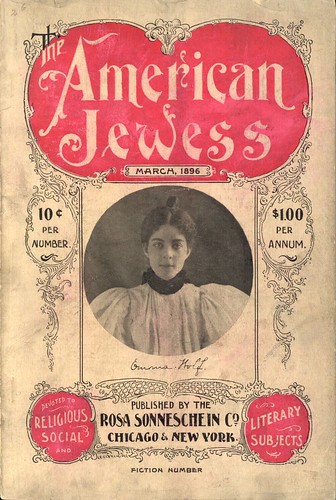The American Jewess: Religious Observance in 1896
by Rebecca Honig Friedman. Cross-posted on the Jewess blog.
 Some of the articles we're finding in our look at The American Jewess archives seem surprisingly contemporary (19th century language aside), yet a closer look reveals the more subtle points of contrast between how we approach particular issues now vs. then.
Some of the articles we're finding in our look at The American Jewess archives seem surprisingly contemporary (19th century language aside), yet a closer look reveals the more subtle points of contrast between how we approach particular issues now vs. then.
Take the piece "Judaism and Its Ceremonies," by Sarah Kussy of Newark, NJ, in which she exhorts readers to consider the importance of the Jewish rituals and practices that modern, turn-of-the-century Jewesses so often neglected:
"And to-day, when we are inclined to chaff at the ritualism which Judaism still imposes, when old-time customs and ceremonies are regarded in the light of rubbish, from contact with which the purity of religion might receive a stain, let us consider a moment how they influenced the race in the past, and compare the results with our present state. Because ceremonies are in themselves not an end, but a means to effect that end, too apt are we to underrate their full importance and significance. Religion, however, let us remember, is not always spontaneously active within us, and sometimes requires stimulating means from without to rouse it to life and enthusiasm ... It is sadly evident, that with the departure of old-time customs from our midst, the reverential and devotional feelings they inspired have also vanished. How strongly is this apparent when we compare an American Jewish Sabbath with the day of rest our fathers were wont to celebrate!"
The bolded statement could easily, and has been, made in any classroom of Jewish education, and is reminiscent of the rabbinic proverb Acharei ha'peulot numshachim halevavot, "the heart follows action." (first related to me through the words of the great Biblical scholar Nechama Leibowitz, born a few years after this piece was written). Yet, if Sarah Kussy were writing today, it's likely she would tackle a different problem. Because today the fear (at least among non-Orthodox) is not that people are abandoning Jewish practice but that they are abandoning Jewish identity. Jewish religious practice is, in many respects, as is evident from this article, much healthier than it was in 1896, and certainly easier. Being a modern Jew doesn't mean abandoning ritual, it means practicing ritual in more inclusive ways that are more in-line with modern values. What we have now is what Sarah Kussy was hoping for -- a balance between modernity and Jewish practice. Surely there is disagreement among contemporary Jews on whether we've reached the correct balance, but that's a separate issue. Today, Sarah Kussy would likely be addressing the Jews who no longer practice Jewish ritual not because they think it's unhip but because they no longer see themselves as Jewish.
Here are excerpts from the rest of the article, which is a nice reminder that of how far we've come in our collective spiritual life since then and, in some ways, how far we haven't:
"Yet we need not go back to the Middle Ages to find hallowed customs observed on the sacred day, for homes still exist where the Sabbath lamps are lighted, where the Kiddush is said and the S'miroth sung, where children are blessed on returning from the synagogue and the day is recognized as holy to the Lord. And yet we boast of our modern innovations, our beautiful temples, our magnificent singers who utter the Shi'ma Yisroel without understanding its meaning; we boast of these, but they are not sufficiently powerful instruments "in the service of the Almighty" to do away with the necessity for Sunday services; for men are in business on Saturday, their spiritual welfare does not concern them, and, what is worse by far, Hebrew women have the shopping and marketing to attend to. Have we, then, lost nothing by departing from old-time customs? Has the spiritual nature of the modern Jew in nowise been debased by the change? ... To-day, when the West glows with the light which our fathers vainly sought in the East, when Columbia holds out to the Jew the welcome he so longed to find in Palestine, the ancient faith, together with the exalted conception of the God it embraces, would be more firmly established in the minds of its so-called adherents were our ceremonies and observances, that arouse religious sentiment, a little more closely adhered to, for sentiment must ever remain an essential part of religion-a fact we are likely to forget in this materialistic age, where everything, even our creed, is being made more and more practical; when we no longer look for spontaneity in matters of faith, and are inclined to regard idealism in religions as a breath from the past, when seers prophesied, and nations blindly accepted the guide of a few zealous in the service of the Lord. Well, perhaps this age is right. But let us not forget that it was the idealism of Judaism that sustained our race, and that, had facts alone been their mainstay, the cold, hard fact of nearly twenty centuries of endless suffering would long ago have terminated the temporal existence of Israel. Yes, as a recent writer says, "religion is becoming more and more practical, but God forbid that it should not be also theoretical!" and in plucking the weeds from the garden of our faith, in discouraging ignorance and superstition, let us beware that we encroach not too dangerously near the roots of the precious flowers planted by our early Jewish teachers, nourished but too often by the blood of their disciples. In our striving after truth, let us cherish, let us keep intact every custom and observance that may elevate the heart to a purer conception of the Divine Being, the Source and Essence of all Truth and Light! - Newark, N. J. SARAH KUSSY."






